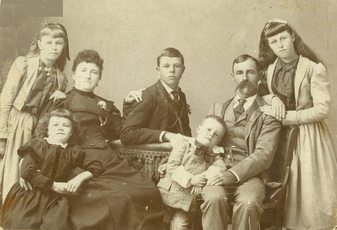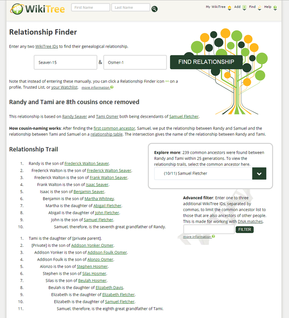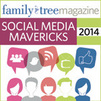|
A single surname society is one where data and research on a particular surname beyond their own family members with that surname is gathered and published by researchers. These types of societies provide a single surname researcher a place to publish their work and to collaborate with other single surname researchers on that surname. This type of research, of course, can also be a great reference for any type of researcher to use. Below is a press release from a new society for single surnames called The Surname Society. You can join if you are interested in researching single surnames beyond your own family tree and then you can collaborate with others researching the same name. This new single surname society provides collaboration with other researchers around the world using online technology only. Take a look at what they have to offer below in their press release and on their website. Also, you can search their website for your particular surnames and see what research they have published already. They also have an introductory recorded Hangout On Air video on their "About Us" webpage. ~Caroline The founder members are delighted to announce the launch of The Surname Society - the online society for individuals, groups and associations with an interest in surname studies, regardless of their location in the world, the surname they are studying, or their level of research expertise.
Focussing on single surname studies, the society meets the needs of researchers in the world of family history and genealogy as it evolves in the 21st century. The Surname Society’s vision is to connect like-minded people by providing facilities which enable members to share knowledge, data and good practice with others. The society allows members to register both worldwide and limited studies and is entirely online. Collaboration is facilitated and encouraged as it is the core ethos of The Surname Society. Surname researchers collect data relating to all name bearers, either on a global or restricted basis. The society does not mandate study methods and members are encouraged to develop their own approach to the investigation of their surname to advance their knowledge and expertise in areas such as etymology, DNA, name collection and family reconstruction. The Surname Society will help and advise inexperienced members on ways to conduct their study and how to avoid the pitfalls which can occur! A truly global organisation from the outset, the committee members are located around the world from Australia to England, Spain and Canada and in the first week since its announcement to those who completed the online questionnaire, the society has almost one hundred new and enthusiastic members. The cost of membership to The Surname Society is just £5 per annum with no hidden extras. You can register as many names as you want on either a restricted or worldwide basis, collaborate with others, share in the educational opportunities offered and a plethora of resources in the Members’ area of the website including a fascinating quarterly e-newsletter and the School of Surnames, with many other developments in the pipeline in due course. So, what are you waiting for? Take a look at the website and if you are interested, join! For more information visit http://surname-society.org, email [email protected] and/or follow us on Twitter: @surnamesoc
0 Comments
Will I find my Annie O'Brien and my O'Brien and Lennon families this weekend? Annie (O'Brien) Vaughan is seated and 3rd from the left. Annie (O'Brien) Vaughan is seated and 3rd from the left. Every Friday, Findmypast releases thousands of new records online. This week's Findmypast Friday release includes wills and probate indexes as well as Thom's Directory, an Irish street directory and almanac, spanning the years 1844-1900. If you have Irish ancestry and have begun researching it (like I have), you know just how difficult it can be with a lack of records. And street directories can help to place your ancestor in a time and place between censuses. And the UK wills and probate records and abstracts can also be very helpful too. Abstracts can reveal spouses, children, etc., and also give you names of witnesses who may or may not have been related. Take a look at what they added:
So, if your roots take you back to Ireland or the UK, you'll want to check out all these new records as well as all of the Findmypast online records since it's a FREE weekend starting today. Plus, if you have roots across the pond, but don't know how to get started, then you're in luck. They have a free live broadcast tomorrow to help you out. And since Thom's Directory is for Dublin and my Annie O'Brien was born there and I've been needing to isolate all the O'Brien's and the Lennon's for this time period *and* since Findmypast is FREE this weekend, I think I'll forego sleep and delve into Findmypast into the wee hours of the weekend. (Time to dig out that old street map of Dublin I found online. Oh, Annie, Henry, James, and Jane...I'm coming for you.) Do you have O'Briens and Lennons in your family tree? Are we related? To read more about my research exploits with Annie et al, visit my personal (and very neglected) Family Stories blog. ~Caroline  Click on image for a larger view. Click on image for a larger view. This press release was just received from WikiTree. While I have a tree on WikiTree, it's not my main tree, but as I have delved into DNA testing and the myriad of ways to analyze the data, these 2 new DNA tools are going to be very helpful to me. And coming to that conclusion this morning, I logged onto my WikiTree tree and explored their DNA tools and other new-to-me tools early this morning. I added a few more people like siblings, merged some duplicates, looked at a merged ancestor a distant cousin had made for us with a common ancestor, and looked at all the of WikiTree's DNA tools which I had not even looked at before. Then I added all my DNA tests and info to my tree. It takes a while for that information to get processed, I think, but what I found was that the information in general that WikiTree provides about DNA and DNA testing would really help others who have taken DNA tests for genealogy and are lost with their results. They really do a good job of explaining DNA for genealogy and what other DNA tests you need to get and why for confirming your research. The navigation on the site is not as intuitive as I'd like, but if you're willing to click on all the links to find information, then you will be rewarded. So, you have to "play" with it. [But, hey, another weekend is just about here. ;) ] Read their press release below which explains their new DNA tools. ~Caroline FOR IMMEDIATE RELEASE: November 6, 2014
Contact: Eowyn Langholf, [email protected] WikiTree Makes Finding Relationships with DNA Matches Easier 6 November 2014: Today WikiTree.com is announcing two important features for genealogists who have taken DNA tests. These features make WikiTree’s Relationship Finder a uniquely powerful tool for genealogists who have taken 23andMe, AncestryDNA, and FTDNA Family Finder tests. “One of the biggest challenges facing genetic genealogists,” according to Dr. Blaine Bettinger, author of the long-running blog The GeneticGenealogist, “is finding the elusive common ancestor. Finding genetic matches is easy, but finding the common ancestor from whom we inherited a segment DNA is very hard. WikiTree’s new Relationship Finder is a great tool for identifying the ancestors that two or more people share in common.” All Common Ancestors Genealogical relationship finders are generally designed to find the first common ancestor between two people. Genetic genealogists need to know about all the common ancestors they share with a match. Everyone’s family tree intertwines in multiple ways. The first shared ancestor may not be the reason for a shared segment of autosomal DNA. WikiTree’s Relationship Finder now enables you to easily browse all your common ancestors. Filtering for Multiple Matches When a genealogist shares a segment of autosomal DNA with two or more other people who also match each other on that segment, it’s a big clue in discovering which ancestor it came from. WikiTree’s Relationship Finder now enables you to filter the common ancestors shared by two people to only display common ancestors who are also shared by a third, fourth, or fifth person. The Universal Family Tree These Relationship Finder features are possible because WikiTree members are collaborating on a single tree for the entire human family. “The genetic genealogy community absolutely must have a universal family tree,” says leading genetic genealogist Dr. Tim Janzen. “With smaller unlinked trees it's frequently impossible to see all of the true genealogical connections with the people who share autosomal DNA with us. We are finally getting to the point where this vision is becoming a reality at WikiTree.” About WikiTree WikiTree: The Free Family Tree has been growing since 2008. Community members privately collaborate with close family members on modern family history and publicly collaborate with other genealogists on deep ancestry. Since all the private and public profiles are connected on the same system this process is helping to grow a single, worldwide family tree that will eventually connect us all and thereby make it free and easy for anyone to discover their roots. See http://www.WikiTree.com.  The following press release was just received from Findmypast — looks like some free binge researching time this weekend for Veterans Weekend plus a live broadcast to show how to use their records. Read on for all the details: Explore Findmypast’s billions of historical records for FREE this Veterans Weekend
This Veterans Weekend, we want to help everyone find their First World War ancestors and learn more about their family history. So we’re delighted to announce that this Veterans Weekend, we’ll be opening up our archives and giving unlimited free access to billions of records and newspaper pages from all over the world. That means that between 7am on Friday, November 7th and 7am on Monday, November 10th (EST), absolutely everyone will have access to all our historical records, including:
As well as millions of other records that will give everyone the opportunity to explore their family history and bring their past to life. It’s not only new users who will be able to take their family history research further this weekend. Those with current Findmypast Local subscriptions (with an active Britain, Ireland, US & Canada or Australia & New Zealand subscription) will be able to access all our historical World records during the free access weekend. Those with active World subscriptions will have an additional three days added on to their subscription. Find out more at our dedicated Free Weekend page. Live Broadcast This Saturday 8th November, we will be hosting our first ever Live Broadcast. Featuring an expert panel including Findmypast’s Director of Family History, Joshua Taylor, military historian Paul Nixon, and Who Do You Think You Are?’s Lead Genealogist Laura Berry, the broadcast is designed to help everyone get further with their family history research. The talks will cover a wide range of topics – from getting started to breaking down brick walls – and viewers can choose to watch the entire event, or tune in for specific presentations. The Live Broadcast will be shown at http://new.livestream.com/innerear/findmypast at 10am (EST) on Saturday 8th November. All of the presentations can also be watched on demand after the broadcast on the Veterans Weekend section of our blog. See the programme below, and read more about the speakers and their talks on our blog. Live Broadcast Programme
(all times EST) Live Family History Facebook Q&A Directly after our Live Broadcast, we’ll also be hosting a live Q&A on family history researching on our global Facebook page with some of our speakers. Join us between 5.30 and 6.30pm GMT (4.30-5.30am AEDT) to join the discussion on how to get started or break down your family history brick walls. You can submit your questions in advance to our Facebook wall, send them @Findmypast on Twitter using the hashtag #FMPLive, or join us live on Facebook on Saturdayevening. Follow @Findmypast on Twitter and use the hashtag #FMPLive to follow our event updates. For further information please contact: [email protected] About Findmypast Findmypast has been a leading family history website for more than 10 years. It’s a searchable online archive of billions family history records, from parish records and censuses to migration records, military collections, historical newspapers and lots more. For our members around the world, Findmypast is a crucial resource for building family trees and doing detailed historical research. In April 2003 the company was the first to provide access to the complete birth, marriage, and death indexes for England & Wales, winning the Queen’s Award for Innovation. Since that time, Findmypast has digitised family history records from across the globe, including major collections from Britain, Ireland, Australia, and the United States. In partnership with the British Library, Findmypast is part of a project to safeguard the future of the world’s greatest newspaper archive – allowing digital access to more than 40 million newspaper pages. Recently, The National Archives awarded the company the exclusive rights to put the 1939 Register for England and Wales online. www.findmypast.com |
Categories
All
Archives
February 2017
|
|
© Copyright For Your Family Story 2016 - All Rights Reserved
|


